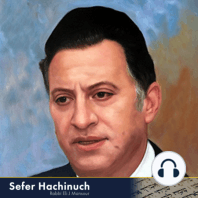20 min listen
Misva #74: Not to Listen to a Litigant’s Claims in the Other Litigant’s Absence
FromSefer Hachinuch
ratings:
Length:
20 minutes
Released:
Nov 16, 2021
Format:
Podcast episode
Description
The Torah commands in Parashat Mishpatim (Shemot 23:1), “Lo Tisa Shema Shav” – a difficult verse which the Sages understood as a prohibition against placing oneself in a position where he will hear false, misleading information. Specifically, the Torah here commands judges not to hear one litigant’s arguments when the other litigant is not present. The Sefer Ha’hinuch explains that a litigant is more prone to speak untruthfully in the other party’s absence, because people generally do not have the audacity to speak falsely about somebody to his face. Therefore, the Torah forbade judges from hearing a litigant’s arguments when the other litigant is not present, because the litigant might lie and thereby mislead the judges to accept his claims. If a judge agrees to hear a litigant’s claims in the other’s absence, in violation of this command, the litigant is forbidden by force of this Biblical command from presenting his claims until the other litigant arrives. This command also introduces the broader prohibition against involving ourselves in any sort of falsehood. Additionally, the Sages interpreted this verse as establishing the famous prohibition of Lashon Ha’ra – speaking or accepting unflattering information about another person. In discussing this Misva, the Sefer Ha’hinuch elaborates upon the particular importance of honesty in Torah life. He says that dishonesty is “Nit’ab” – “abominable,” adding, “En Dabar Ma’us Mimenu” – “There is nothing more repulsive than it.” If a person speaks untruthfully, the Sefer Ha’hinuch writes, then “his home becomes filled with curse.” The Sefer Ha’hinuch explains that “Emet” (truthfulness) is one of G-d’s qualities, and blessing is attained by those who follow G-d’s example and live in accordance with His attributes, such as compassion, kindness and honesty. We bring upon ourselves G-d’s blessings by acting as He does. Conversely, if a person conducts himself in a manner that is contrary to G-d’s attributes, he brings upon himself the opposite of blessing, Heaven forbid. Therefore, one who engages in falsehood brings, in the Sefer Ha’hinuch’s words, “the opposite of blessing, the opposite of joy, the opposite of peace, and the opposite of enjoyment.” And for this reason, the Sefer Ha’hinuch writes, the Torah commands several verses later (23:7), “Mi’debar Sheker Tirhak” – that we must distance ourselves from falsehood. Nowhere else does the Torah command us to “keep a distance” from a specific kind of misconduct. This is said only about falsehood because of its uniquely grotesque nature. Hence, the Sefer Ha’hinuch writes, the Torah forbids judges from hearing a litigant’s claims in the other’s absence, even though the litigant might actually be speaking the truth, because of the risk that he will speak falsely. This is one example of the Torah’s insistence on avoiding even the remote possibility of falsehood. The Sefer Ha’hinuch further notes that the Gemara repeatedly speaks in praise of honest judges, and condemns dishonest judges, testifying to the critical importance of integrity. This Misva applies at all times and in all places. One who transgresses this prohibition is not liable to Malkut, because this violation is committed verbally, without the performance of an action. The broader message of this Misva is that we must always speak honestly and as accurately as possible. Sometimes people impulsively state things which they do not actually know to be true. The value of “Emet” demands that we have the humility to acknowledge what we do not know, and to ensure to speak the precise truth at all times.
Released:
Nov 16, 2021
Format:
Podcast episode
Titles in the series (100)
Misva #19: The Prohibition Against Eating Hametz on Pesach: Daily Sefer Hachinuch - Brought to you by itorah.com by Sefer Hachinuch
